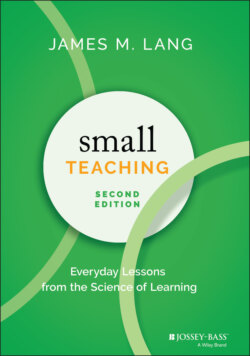Читать книгу Small Teaching - James M. Lang - Страница 14
Activating Prior Knowledge
ОглавлениеEngaging in an act of prediction begins with my rooting around in my brain for anything which I already know that will help me make a successful prediction. It requires me to tap into my existing knowledge and skills, whatever they might be. I use my existing knowledge of French culture to predict what will happen in the video, or my prior knowledge of chemistry to predict what will happen in an experiment. This activation of prior knowledge, as learning researchers call it, has been demonstrated as having plenty of power to boost learning. “Prior knowledge plays a critical role in learning,” explain Susan Ambrose and Marsha Lovett, “which means that…faculty members need to assess the content, beliefs and skills students bring with them into courses and…use that information as both a foundation for new learning as well as an opportunity to intervene when content knowledge is inaccurate or insufficient” (Ambrose and Lovett 2014, p. 16). The easiest way to activate the prior knowledge of your students is to ask them to make individual and collective knowledge dumps, telling you everything they know—or think they know—about your subject before you begin teaching them. You might think about this as a pre-prediction activity, or a half-step toward prediction. Instead of drawing up their prior knowledge and using it to solve a new problem, students are simply drawing up that prior knowledge and showing it to you—and the research suggests that this step on its own, even if they don't use their prior knowledge to solve a new problem, can prepare them for deeper learning.
Our first small teaching strategy might therefore be the easiest one to implement in the book: before you teach something new to your students, ask them what they already know about it. You could do this in multiple ways that fit the frame of small teaching:
Prior to introducing new content in a course, ask students to take a pre-quiz or respond to two or three questions about the subject matter on the course's learning management system and then summarize those results briefly at the start of the first or second class.
At the start of any individual class period, ask students to write down what they think they already know about the subject for that day. Tell them to list three to five things they have learned in previous classes or from their life experiences, and have them pair up to compare notes. Solicit a few responses and build on them in the opening of your presentation of the new material.
At the start of the semester, devote part of one class period to assessing students' current state of knowledge, either through whole-class or group activities or through a written pretest. Once you have heard what students have to offer in such an exercise and have gained a glimpse into their existing knowledge, you can strategize how to build upon it most effectively in the course.
As an example of the third suggestion, when I teach a seminar on twenty-first-century British literature and culture, I set aside 30 minutes on the first day of the semester for a knowledge dump in which students respond to the following question: “When I say the word British, what are the primary impressions that form in your mind?” I pose this question and give them a few minutes to make a list on paper, and then we fill up the board with their impressions. I try to categorize their impressions so we can see patterns—and the same basic patterns always emerge. British to them means the royal family, traditional activities like having tea and biscuits or taking long walks in the country, green landscapes, and ruined castles. None of them ever mention the ethnic diversity of Britain, or the fact that Britishness encompasses the peoples of Scotland and Wales and Northern Ireland, or its recent political history. The second class period, in which we begin considering the political and cultural context of British literature, then gives me an opportunity not to dismiss their impressions but to build upon them as I introduce features of Britishness that they have never encountered. Throughout the semester I will occasionally return to the impressions we laid out on that first day and remind them about how our current text or discussion connects back to them. Such an opening-class activity can obviously work in almost any type of course, modified in ways that best fit your inclinations. For an upper-level course you might want to narrow down the questions, since they might have more general extensive knowledge than would fit into a paragraph. The overall strategy here remains happily simple: prior to the introduction of any major new chunk of course content, spend a class period (for a whole course) or a few minutes (for a new unit) asking them what they already know.
